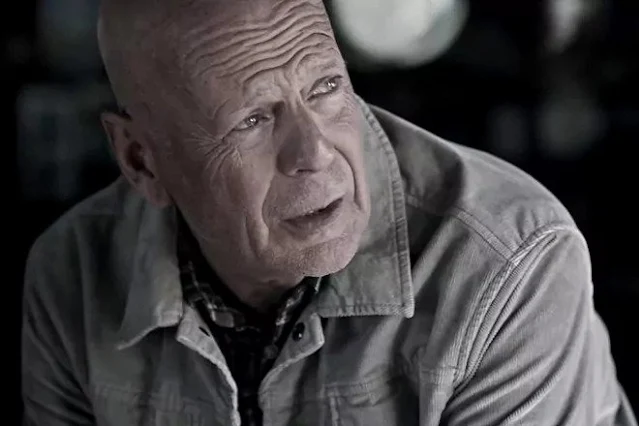The actor Bruce Willis diagnosed with dementia | What is Dementia ? Breaking Down Dementia: Myths, Misconceptions, and Stigma
The actor Bruce Willis, the beloved STAR of the Die Hard franchise, has been diagnosed with frontotemporal DEMENTIA according to a statement released by his family recently.
Who is Bruce Willis ?
Bruce Willis is an American actor, producer, and singer, who has appeared in numerous films, television shows, and theater productions. He was born on March 19, 1955, in Idar-Oberstein, West Germany (now Germany), but was raised in New Jersey, United States.
Willis rose to fame in the late 1980s and early 1990s with his portrayal of John McClane in the "Die Hard" film series. He has also appeared in other popular movies such as "Armageddon," "The Sixth Sense," "Pulp Fiction," "The Fifth Element," and "Moonrise Kingdom."
In addition to his acting career, Willis has produced several movies and television shows, and has even released a few albums as a singer. Over the course of his career, he has won several awards, including a Golden Globe, an Emmy, and numerous other accolades.
Recently, according to a statement released by his family, Bruce Willis, the beloved star of the Die Hard franchise, has been diagnosed with frontotemporal dementia nearly a year after retiring from acting due to aphasia that affected his cognitive abilities.
What Is Dementia?
Loss of memory, language, problem-solving, and other thinking abilities that severely impact daily life are categorized under the term dementia, with Alzheimer's disease being the leading cause."
"Understanding Dementia: Causes, Symptoms, and Treatment Options"
Dementia is a chronic neurodegenerative disorder that affects a person's cognitive function, including memory, thinking, and reasoning. The causes of dementia can vary and often involve damage to the brain's neurons, which can result from factors such as aging, genetics, head injuries, or diseases like Alzheimer's. Symptoms of dementia may include memory loss, confusion, difficulty with language or communication, and changes in mood or behavior. Treatment options for dementia can also vary depending on the cause and stage of the disease, but can include medications to manage symptoms, cognitive therapy, and lifestyle changes. Early diagnosis and intervention can be crucial in improving the quality of life for those with dementia and their caregivers.
Symptoms and signs of dementia
Dementia is a term used to describe a group of symptoms associated with a decline in memory, thinking, and other cognitive skills that are severe enough to interfere with daily activities. One of the most common signs of dementia is memory loss, particularly short-term memory loss, which may manifest as forgetting important dates, events, or appointments. Other symptoms may include difficulty with communication and language, changes in mood or behavior, confusion and disorientation, and a loss of interest in previously enjoyed activities. As the disease progresses, individuals with dementia may experience difficulty with basic tasks such as dressing, bathing, or eating. It is important to note that not all memory loss or cognitive decline is indicative of dementia, and a proper diagnosis can only be made by a healthcare professional. If you or a loved one are experiencing symptoms of dementia, it is important to seek medical advice to determine the cause and appropriate course of treatment.
In shorts the symptoms are as follows:
#Memory loss: One of the most common signs of dementia is memory loss, especially short-term memory loss.
#Communication and language difficulties: Individuals with dementia may have difficulty with communication, such as finding the right words or understanding others.
#Changes in mood or behavior: Dementia can cause changes in mood, such as increased anxiety or depression, and changes in behavior, such as restlessness or agitation.
#Confusion and disorientation: People with dementia may become confused about their surroundings or have difficulty recognizing familiar places or people.
#Difficulty with daily tasks: As the disease progresses, individuals with dementia may have difficulty with basic tasks such as dressing, bathing, or eating.
#Communication and language difficulties: Individuals with dementia may have difficulty with communication, such as finding the right words or understanding others.
#Changes in mood or behavior: Dementia can cause changes in mood, such as increased anxiety or depression, and changes in behavior, such as restlessness or agitation.
#Confusion and disorientation: People with dementia may become confused about their surroundings or have difficulty recognizing familiar places or people.
#Difficulty with daily tasks: As the disease progresses, individuals with dementia may have difficulty with basic tasks such as dressing, bathing, or eating.
The Impact of Dementia on Patients, Caregivers, and Society
Dementia can have a significant impact not only on the individuals who are diagnosed with the condition, but also on their caregivers and on society as a whole. Patients with dementia may experience a decline in their quality of life, as the disease can impact their ability to perform daily activities, interact with others, and maintain their independence. Caregivers, meanwhile, may experience high levels of stress and burden as they provide support for their loved ones with dementia. In addition, the costs of care for those with dementia can be substantial, and can have broader economic implications for society. Dementia can also have an impact on healthcare systems, as the disease can be complex and require significant resources to manage. As such, it is important for individuals, families, and society as a whole to address the challenges posed by dementia and to work towards improving care and support for those impacted by the disease.
Preventing Dementia: Lifestyle Changes and Risk Reduction Strategies
While there is currently no known cure for dementia, there are steps that individuals can take to reduce their risk of developing the disease. One of the most effective ways to prevent dementia is through lifestyle changes, such as regular exercise, maintaining a healthy diet, and engaging in cognitive activities like reading or puzzles. Additionally, reducing risk factors such as smoking, excessive alcohol consumption, and high blood pressure can also help to lower the risk of dementia. Education and social engagement have also been shown to be effective in reducing the risk of dementia. Furthermore, individuals who have a family history of dementia or who have experienced head injuries in the past may also benefit from taking additional precautions to reduce their risk. By adopting healthy lifestyle habits and addressing risk factors, individuals can take proactive steps towards reducing their risk of developing dementia.
Breaking Down the Stigma of Dementia: Overcoming Misconceptions and Misunderstandings
Despite the prevalence of dementia, there remains a significant amount of stigma and misconceptions surrounding the disease. One of the biggest misconceptions is that dementia is a natural part of aging, when in fact it is a neurological disorder. This misconception can lead to a lack of understanding and empathy towards those who are impacted by the disease. Additionally, there is often a perception that those with dementia are no longer capable of contributing to society or leading fulfilling lives, when in reality many individuals with dementia continue to be active and engaged members of their communities. Addressing these misconceptions and breaking down the stigma of dementia is important not only for the individuals impacted by the disease, but also for society as a whole. It can help to promote greater understanding and compassion, and to improve the quality of care and support for those with dementia and their caregivers. By working to overcome misunderstandings and promote awareness, we can help to create a more inclusive and supportive society for all individuals impacted by dementia.
The Latest Research on Dementia: New Findings and Promising Treatment Approaches
Advances in research on dementia have led to new findings and promising treatment approaches that offer hope for those impacted by the disease. Some recent studies have suggested that lifestyle factors, such as regular exercise and a healthy diet, can play an important role in reducing the risk of dementia. Other research has focused on identifying early markers of the disease and developing more accurate diagnostic tools. In terms of treatment, there has been a growing interest in non-pharmacological approaches, such as cognitive stimulation therapy, that can help to improve quality of life for those with dementia. In addition, there has been significant progress in the development of new drugs and therapies that may help to slow or even halt the progression of the disease. While much work remains to be done, the latest research on dementia offers hope for those impacted by the disease and suggests that there is reason to be optimistic about the future of dementia care and treatment.
Caring for a Loved One with Dementia: Practical Tips and Resources
Caring for a loved one with dementia can be a challenging and emotional experience, but there are many practical tips and resources available to help make the process more manageable. One of the most important things is to educate yourself about the disease and its progression, so that you can better understand your loved one's needs and behaviors. It is also important to seek out support, whether through support groups, counseling, or respite care, to help manage the emotional and physical toll of caregiving. Additionally, there are many tools and resources available to help with daily care tasks, such as medication reminders, meal planning, and mobility aids. Technology can also be a valuable resource, with many apps and devices available to help monitor and manage symptoms, keep track of appointments, and stay connected with loved ones. Finally, it is important to take care of yourself as a caregiver, by making time for self-care, setting boundaries, and seeking help when needed. With the right tools and resources, it is possible to provide high-quality care and support for a loved one with dementia while also taking care of yourself.
Dementia treatment and care:
While there is currently no cure for dementia, there are treatments and care options available that can help manage the symptoms and improve quality of life for those impacted by the disease. Treatment options may include medications to manage symptoms such as memory loss or agitation, as well as non-pharmacological approaches such as cognitive stimulation therapy, which can help to maintain cognitive function and slow the progression of the disease. In addition, it is important to provide a supportive and caring environment for individuals with dementia, including a safe and comfortable living space, assistance with daily tasks, and social engagement to help reduce isolation and maintain connections with family and friends. Caregiver support is also essential, including respite care, counseling, and education on the disease and caregiving strategies. As the disease progresses, it may become necessary to consider options such as in-home care, assisted living, or memory care facilities, depending on the individual's needs and resources. With the right treatment and care, individuals with dementia can continue to live fulfilling lives and maintain a sense of dignity and independence for as long as possible.
Conclusion:
In conclusion, dementia is a complex and challenging disease that impacts not only individuals with the condition, but also their caregivers, families, and society as a whole. While there is currently no cure for dementia, there are many treatments and care options available that can help manage symptoms, slow the progression of the disease, and improve quality of life for those impacted by the disease. Preventative measures such as lifestyle changes and risk reduction strategies are also important in reducing the incidence of dementia. In addition, it is important to break down the stigma of dementia and overcome misconceptions and misunderstandings about the disease. With education, support, and compassionate care, it is possible to provide high-quality care and support for individuals with dementia while also caring for their caregivers and families. The latest research is providing new insights and promising treatment approaches that may one day lead to a cure for this debilitating disease. In the meantime, it is important to continue to raise awareness, provide support, and work towards a future where dementia no longer holds such a devastating impact on individuals and society as a whole.





